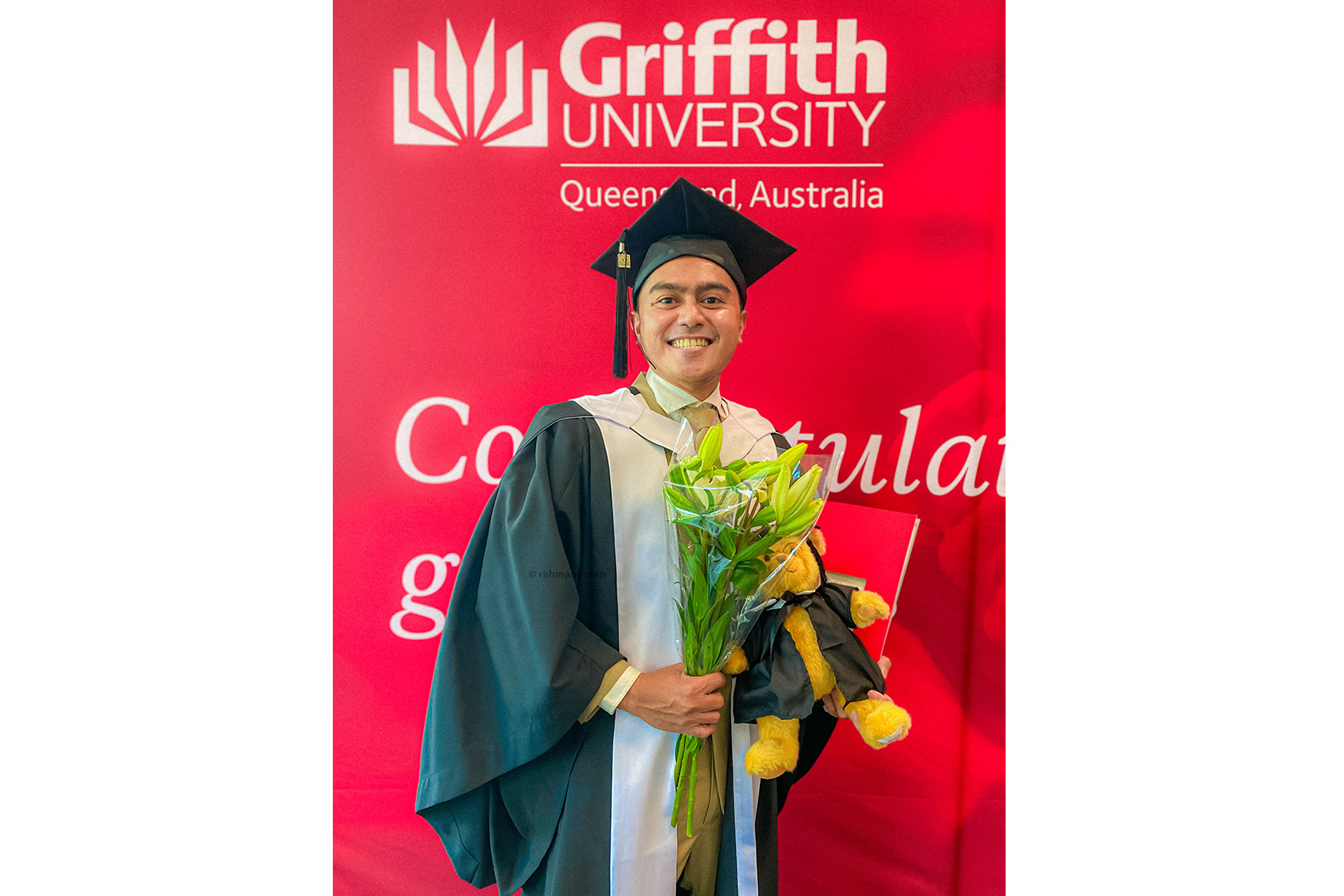One might say that Abdul Rahman Imran is the definition of never giving up. His application for an Australia Awards Scholarship was turned down not once, not twice, but multiple times.
Speaking now as one of Griffith University’s top graduates for 2023, Rahman said the rejections shaped him into who he is today. “It turned out I needed those to spark something in me,” said Rahman, who received an Australia Awards Scholarship to study health promotion at both Hasanuddin University in Makassar and Griffith University on the Gold Coast under the Split-Site Masters Program.
Determination and perseverance were part of his character from a young age. A bad grade in English during junior high school made him enrol in an English course. “I pushed and pushed myself,” Rahman reminisced. “And that’s where I found out about the Australia Award Scholarships, when a teacher became an awardee for a masters degree. From then on, I was inspired to pursue a similar path of studying abroad.”
Born and raised in Gorontalo province, in the north of Sulawesi, Rahman was surrounded by family members who worked in the health sector. “I dreamed of becoming a doctor, but I came from a poor family, and I realised the cost would be too high,” he said.
Rahman chose to study public health at Gorontalo State University. To pay for his university tuition, he took part-time jobs as well as participating in competitions where the winners received a sizable cut in tuition fees. “I took on anything, from English speeches, English debates, being a language ambassador, doing teenage scientific research, to youth exchanges,” he recalled.
“I live by my father’s words that people’s lives can be shaped by two things, money and mind. When lacking money, we can use our minds. At the time, I understood that my parents were trying to tell me that they had no money, and it was up to me to use my mind,” Rahman added.
After graduating university, Rahman joined the health promotion division of Gorontalo Health Agency in 2015. His work included health policy advocacy, public empowerment and education.
The dream of studying abroad, and the previous applications for Australia Awards Scholarships, still lingered on his mind. He continued applying during his years at the health agency, and still received the same rejection email in the end.
“For many years, I applied to the Australia Awards Scholarships, and I was declined. I still have all the emails,” Rahman said. “I didn’t lose hope and got back up immediately as I knew I was still finding my path and I was nowhere in terms of my career. I had the fire within to find my purpose.”
The Dream Gains Urgency
One of the reasons Rahman persevered was the high cost of pursuing a scholarship. To meet the English requirements, he needed to take IELTS or TOEFL courses. The courses were expensive, and because they were not available in his hometown, he had to fly to neighbouring towns to enrol.
When he became a civil servant in 2015, he realised that he needed to pursue higher education even more. “My work required the knowledge,” he said. He also realised why he hadn’t yet been selected for a scholarship.
“Many things within myself were not yet ready. The urgency (to study abroad), my experience, my purpose and goals, my maturity.”
As defiant as he was, Rahman admitted he had been affected by the rejections. When an email from Australia Awards arrived in late 2021, he didn’t have the courage to open it for two days.
“Rejection had been seared into my mind,” he said with a laugh. But due to the split-site program Rahman opted for, there was another email from the Indonesian Health Ministry that delivered the good news, and encouraged him to open the dreaded first email. He immediately cried after reading it and did a prostration of gratitude, to the puzzlement of his colleagues.
Participating in two education systems invited Rahman to reflect on the education in both countries. The program also challenged him, as it required two different theses. The most valuable knowledge he gained was about evaluation, something he says has “nearly lost its meaning” In Indonesia.
“Problems in Indonesia seem to repeat themselves, because we don’t do evaluation properly,” he noted. “A thorough evaluation includes good metrics, methods, instruments, reports and follow up, to prevent us from getting stuck in recurring problems. The lessons from the Australia Awards in Indonesia absolutely opened my eyes to the many elements required for a thorough and complete evaluation and from varied perspectives.”
Advocating for Mental Health
Rahman completed his studies as one of the year’s best graduates at Griffith University and was invited to deliver a speech at the graduation ceremony in late 2023. “I’m confident enough that some of you seated today also commenced your journey with beliefs, doubts, hopes and dreams. Here we are in the middle of the graduation ceremony … We proved it, we did it,” he said in the speech.
Rahman now aspires to do more. Following his thesis on mental health literacy in Gorontalo, he wishes to raise awareness of the issue with the community and the government.
“My research found that the province still lacked in mental health facilities. I experienced centres in Australia where everyone can go just to have someone who listens,” he said, adding that Gorontalo saw an increase in suicides in 2023.
“I intend to advocate for mental health centres in Gorontalo, where everyone can come and pour their hearts out as they please, to capable and non-judgemental social workers.
“I hope mental health literacy can become an important issue nationally and locally, with health centres everywhere that provide counselling. I dream of a reality where people are used to sharing, so we can prevent mental health problems.”
Video courtesy of Hulondalo.id and Griffith University


 Abdul Rahman Imran Brings Determination to Mental Health Promotion in Gorontalo
Abdul Rahman Imran Brings Determination to Mental Health Promotion in Gorontalo
